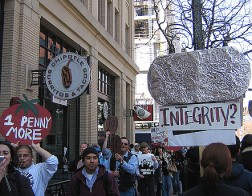Freedom Movement Celebrity Birthday Feast (this year with big round numbers)
Today is a feast day, and a jubilee celebration, declared by edict of the Ministry of Culture in this secessionist republic of one, in honor of those who have worked, and with hope for those who are working today, for the liberation of so many held captive by oppressive governments in foreign nations.
Happy 80th birthday, Martin Luther King Jr.!

We know through painful experience that freedom is never voluntarily given by the oppressor; it must be demanded by the oppressed. Frankly, I have never yet engaged in a direct action movement that was
well timed,according to the timetable of those who have not suffered unduly from the disease of segregation. For years now I have heard the wordsWait!It rings in the ear of every Negro with a piercing familiarity. ThisWaithas almost always meantNever.We must come to see with the distinguished jurist of yesterday thatjustice too long delayed is justice denied.We have waited for more than three hundred and forty years for our constitutional and God-given rights. The nations of Asia and Africa are moving with jet-like speed toward the goal of political independence, and we still creep at horse and buggy pace toward the gaining of a cup of coffee at a lunch counter. I guess it is easy for those who have never felt the stinging darts of segregation to say,
Wait.But when you have seen vicious mobs lynch your mothers and fathers at will and drown your sisters and brothers at whim; when you have seen hate filled policemen curse, kick, brutalize and even kill your black brothers and sisters with impunity; when you see the vast majority of your twenty million Negro brothers smothering in an airtight cage of poverty in the midst of an affluent society; when you suddenly find your tongue twisted and your speech stammering as you seek to explain to your six-year-old daughter why she can’t go to the public amusement park that has just been advertised on television, and see tears welling up in her eyes when she is told that Funtown is closed to colored children, and see the depressing clouds of inferiority begin to form in her little mental sky, and see her begin to distort her little personality by unconsciously developing a bitterness toward white people; when you have to concoct an answer for a five-year-old son asking in agonizing pathos:Daddy, why do white people treat colored people so mean?; when you take a cross-country drive and find it necessary to sleep night after night in the uncomfortable corners of your automobile because no motel will accept you; when you are humiliated day in and day out by nagging signs readingwhiteandcolored; when your first name becomesnigger,your middle name becomesboy(however old you are) and your last name becomesJohn,and your wife and mother are never given the respected titleMrs.; when you are harried by day and haunted by night by the fact that you are a Negro, living constantly at tip-toe stance never quite knowing what to expect next, and plagued with inner fears and outer resentments; when you are forever fighting a degenerating sense ofnobodiness; then you will understand why we find it difficult to wait. There comes a time when the cup of endurance runs over, and men are no longer willing to be plunged into an abyss of despair. I hope, sirs, you can understand our legitimate and unavoidable impatience.You express a great deal of anxiety over our willingness to break laws. This is certainly a legitimate concern. Since we so diligently urge people to obey the Supreme Court’s decision of 1954 outlawing segregation in the public schools, it is rather strange and paradoxical to find us consciously breaking laws. One may well ask:
How can you advocate breaking some laws and obeying others?The answer is found in the fact that there are two types of laws: There are just and there are unjust laws. I would be the first to advocate obeying just laws. One has not only a legal but a moral responsibility to obey just laws. Conversely, one has a moral responsibility to disobey unjust laws. I would agree with Saint Augustine thatAn unjust law is no law at all.… So I can urge men to disobey segregation ordinances because they are morally wrong.
—Martin Luther King Jr., born 80 years ago today on January 15, 1929. This passage is excerpted from his Letter from Birmingham Jail (1963) .
Happy 200th birthday, Pierre-Joseph Proudhon!
.jpg)
The sovereignty of Reason having been substituted for that of Revolution,
The notion of Contract succeeding that of Government,
Historic evolution leading Humanity inevitably to a new system,
Economic criticism having shown that political institutions must be lost in industrial organization,
We may conclude without fear that the revolutionary formula cannot be Direct Legislation, nor Direct Government, nor Simplified Government, that it is NO GOVERNMENT.
Neither monarchy, nor aristocracy, nor even democracy itself, in so far as it may imply any government at all, even though acting in the name of the people, and calling itself the people. No authority, no government, not even popular, that is the Revolution.
Direct legislation, direct government, simplified government, are ancient lies, which they try in vain to rejuvenate. Direct or indirect, simple or complex, governing the people will always be swindling the people. It is always man giving orders to man, the fiction which makes an end to liberty; brute force which cuts questions short, in the place of justice, which alone can answer them; obstinate ambition, which makes a stepping stone of devotion and credulity.
…
… I do not see why I myself should submit to this law. Who guarantees to me its justice, its sincerity? Whence comes it? Who made it? Rousseau teaches in unmistakeable terms, that in a government really democratic and free the citizen, in obeying the law, obeys only his own will. But the law has been made without my participation, despite my absolute disapproval, despite the injury which it inflicts upon me. The State does not bargain with me: it gives me nothing in exchange: it simply practises extortion upon me. Where then is the bond of conscience, reason, passion or interest which binds me?
But what do I say? Laws for one who thinks for himself, and who ought to answer only for his own actions; laws for one who wants to be free, and feels himself worthy of liberty? I am ready to bargain, but I want no laws. I recognize none of them: I protest against every order which it may please some power, from pretended necessity, to impose upon my free will. Laws! We know what they are, and what they are worth! Spider webs for the rich and powerful, steel chains for the weak and poor, fishing nets in the hands of the Government.
You say that you will make but few laws; that you will make them simple and good. That is indeed an admission. The Government is indeed culpable, if it avows thus its faults. No doubt the Government will have engraved on the front of the legislative hall, for the instruction of the legislator and the edification of the people, this Latin verse, which a priest of Boulogne had written over the door to his cellar, as a warning to his Bacchic zeal:
Pastor, ne noceant, bibe pauca sed optima vina. [Pastor, for your health, drink but little wine, but of the best.]
Few laws! Excellent laws! It is impossible. Must not the Government regulate all interests, and judge all disputes; and are not interests, by the nature of society, innumerable; are not relations infinitely variable and changeable? How then is it possible to make few laws? How can they be simple? How can the best law be anything but detestable?
You talk of simplification. But if you can simplify in one point, you can simplify in all. Instead of a million laws, a single law will suffice. What shall this law be? Do not to others what you would not they should do to you: do to others as you would they should do to you. That is the law and the prophets.
But it is evident that this is not a law; it is the elementary formula of justice, the rule of all transactions. Legislative simplification then leads us to the idea of contract, and consequently to the denial of authority. In fact, if there is but a single law, if it solves all the contradictions of society, if it is admitted and accepted by everybody, it is sufficient for the social contract. In promulgating it you announce the end of government. What prevents you then from making this simplification at once?
—Pierre-Joseph Proudhon, born 200 years ago today, on January 15, 1809. This passage is excerpted from The Principle of Authority, the Fourth Study of The General Idea of the Revolution in the Nineteenth Century (1851).
Here’s to many happy returns!
(Reminders of the occasion thanks to this morning’s e-mail from The Daily Bleed.)


